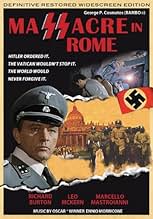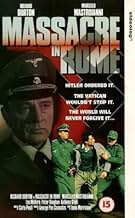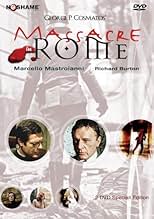NOTE IMDb
6,5/10
1,6 k
MA NOTE
Rome, 23 mars 1944 : 33 soldats allemands sont tués par une bombe.Rome, 23 mars 1944 : 33 soldats allemands sont tués par une bombe.Rome, 23 mars 1944 : 33 soldats allemands sont tués par une bombe.
- Réalisation
- Scénario
- Casting principal
- Récompenses
- 1 victoire et 1 nomination au total
Avis à la une
Excessive Retribution: Marcello Mastroianni, Richard Burton and the Ardeatine Caves Massacre
This film, which is well worth seeing, is dedicated to a particularly cruel event from the Second World War. In retaliation for a bomb attack that killed 33 members of the South Tyrolean police regiment, the National Socialist occupiers murdered 335 Italian civilians in the extensive cave system in the south of Rome.
The film, produced by Carlo Ponti (1912-2007), meticulously recreates the assassination attempt and subsequent massacre. The less than glorious role of Pope Pius XII is also made clear. GOLDEN GLOBE winner Marcello Mastroianni shines as Father Pietro Antonelli, who is determined to prevent disaster. His opponent is ACADEMY AWARD nominee Richard Burton as SS-Obersturmbannführer Herbert Kappler. The resistance fighters are played by Giancarlo Prete (places the bomb as a street sweeper) and Delia Boccardo. The original is by Robert Katz, the music is by ACADEMY AWARD winner Ennio Morricone (THE HATEFUL EIGHT) and the direction is by George Pan Cosmatos.
The German rental title "Tödlicher Error" can almost be described as a misrepresentation of history, the massacre in the Ardeatine Caves was an exorbitant act of retaliation!!!
Well worth seeing, but very painful history lesson!
This film, which is well worth seeing, is dedicated to a particularly cruel event from the Second World War. In retaliation for a bomb attack that killed 33 members of the South Tyrolean police regiment, the National Socialist occupiers murdered 335 Italian civilians in the extensive cave system in the south of Rome.
The film, produced by Carlo Ponti (1912-2007), meticulously recreates the assassination attempt and subsequent massacre. The less than glorious role of Pope Pius XII is also made clear. GOLDEN GLOBE winner Marcello Mastroianni shines as Father Pietro Antonelli, who is determined to prevent disaster. His opponent is ACADEMY AWARD nominee Richard Burton as SS-Obersturmbannführer Herbert Kappler. The resistance fighters are played by Giancarlo Prete (places the bomb as a street sweeper) and Delia Boccardo. The original is by Robert Katz, the music is by ACADEMY AWARD winner Ennio Morricone (THE HATEFUL EIGHT) and the direction is by George Pan Cosmatos.
The German rental title "Tödlicher Error" can almost be described as a misrepresentation of history, the massacre in the Ardeatine Caves was an exorbitant act of retaliation!!!
Well worth seeing, but very painful history lesson!
An Italian war drama; A story depicting the background and events leading up to one of the most devastating wartime atrocities in modern history, the Adreatine Massacre in Rome in 1944. Thirty-three members of the German 11th Company, 3rd Battalion, SS Police Regiment 'Bozen', were attacked and gunned down by the Roman underground. Hitler's reprisal was to order the deaths of ten Roman civilians for each of the thirty-three SS soldiers killed. The Pope ordered that one Roman priest collaborate with the SS to carry it out. George P. Cosmatos directs the drama with a palpable emphasis on plot. Darkly lit to create a looming atmosphere and uncompromising scenes works well. The dialogue moralises about non-involvement, which becomes heavy at times, and there are also many inaccuracies. The character of the Head of the Security Police, Herbert Kappler, was a ruthless war criminal and not war-weary and troubled, as portrayed here by Richard Burton. The German victims in the story were regular Austrian soldiers. Of lesser importance, though, is Father Pietro Antonelli being a composite character. It's a bit cumbersome as it progresses, but as a story, it is interesting for the dilemma of reprisal and absorbing for the conflicting views of morality. Good drama arises from face-to-face confrontations.
This is a retelling of the events leading up to the Ardeatine Massacre, which took place just outside of Rome during World War Two, and the attempts to prevent it happening by various people involved.
The massacre was a direct response by the SS in retaliation for partisan bomb that was detonated in the middle of Rome while an SS company was marching through the city, and the order to kill ten men for every German soldier killed came direct from Adolf Hitler himself. There's a lot of controversy regarding the Vatican's knowledge about the event too, and the film does a good job of drawing attention to this without being completely accusatory.
Richard Burton plays Col. Keppler, a weary SS officer who loves Rome. Along with arrogant Prussian adjutant John Steiner, he knows that the Third Reich is ending and his main concern is that his name is announced by the BBC on their war crimes list that is broadcast every night. Burton seems genuinely concerned for the people of Rome, while Steiner just wants to save his arse. Marcello Mastroianni is the local priest involved in art restoration who strikes up an uneasy friendship with Burton, although conversation usually devolves into the two throwing veiled insults at each other. The Italian fascists want to celebrate the anniversary of fascism openly but Burton suggests that they do it behind doors, as Rome has become a bit of a ticking bomb politically. His commanding officer, old school General Leo McKern, plays down the possibility of an attack but then blames Burton when the entire company are blown away by partisans Giancarlo Prete and Renzo Palmer (both of whom speak perfect English, despite always being dubbed in any other film I've seen them in).
The film then becomes a kind of reverse Schindler's List as Burton must find ten men for every soldier killed - 320 in total. Burton at first adds all the political and condemned prisoners on the list, then all the jews, then anyone else he can find while both Steiner and Mastroianni separately contact the Vatican in order the step in and have the Pope try and prevent the massacre. Guess what happens there? Despite the avalanche of later Nazisplotation films Italy would dump on the world, this one is played one hundred percent straight with no over the top violence and nudity, just people acting their socks off. The most tense part of the film is when the partisans are waiting for the SS company to show up, as Giancarlo Prete constantly chases off the locals while trying to hide a bomb in his dust cart. Burton plays the burned-out SS soldier in a sympathetic way, but it's still hard to feel sorry for a guy who is basically preparing a list of people to be murdered. Steiner makes a mark as an officer who just oozes Prussian arrogance, and it's nice to see him in something a bit more serious than usual.
Of course, the Italians would take a huge dump on the memories of everyone in the war, and their own nefarious involvement in it, by making such films as Achtung! The Desert Tigers, Women's Camp 119, The Beast In Heat, Nazi Love Camp 27, SS Experiment Love Camp, Deported Women of the Special SS Section, The Red Nights of the Gestapo, The Gestapo's Last Orgy (aka Caligula Reincarnated as Hitler), SS Camp 5: Women's Hell, and Hitler's Last Train. You were on their side, you tw*ts!
Richard Burton plays Col. Keppler, a weary SS officer who loves Rome. Along with arrogant Prussian adjutant John Steiner, he knows that the Third Reich is ending and his main concern is that his name is announced by the BBC on their war crimes list that is broadcast every night. Burton seems genuinely concerned for the people of Rome, while Steiner just wants to save his arse. Marcello Mastroianni is the local priest involved in art restoration who strikes up an uneasy friendship with Burton, although conversation usually devolves into the two throwing veiled insults at each other. The Italian fascists want to celebrate the anniversary of fascism openly but Burton suggests that they do it behind doors, as Rome has become a bit of a ticking bomb politically. His commanding officer, old school General Leo McKern, plays down the possibility of an attack but then blames Burton when the entire company are blown away by partisans Giancarlo Prete and Renzo Palmer (both of whom speak perfect English, despite always being dubbed in any other film I've seen them in).
The film then becomes a kind of reverse Schindler's List as Burton must find ten men for every soldier killed - 320 in total. Burton at first adds all the political and condemned prisoners on the list, then all the jews, then anyone else he can find while both Steiner and Mastroianni separately contact the Vatican in order the step in and have the Pope try and prevent the massacre. Guess what happens there? Despite the avalanche of later Nazisplotation films Italy would dump on the world, this one is played one hundred percent straight with no over the top violence and nudity, just people acting their socks off. The most tense part of the film is when the partisans are waiting for the SS company to show up, as Giancarlo Prete constantly chases off the locals while trying to hide a bomb in his dust cart. Burton plays the burned-out SS soldier in a sympathetic way, but it's still hard to feel sorry for a guy who is basically preparing a list of people to be murdered. Steiner makes a mark as an officer who just oozes Prussian arrogance, and it's nice to see him in something a bit more serious than usual.
Of course, the Italians would take a huge dump on the memories of everyone in the war, and their own nefarious involvement in it, by making such films as Achtung! The Desert Tigers, Women's Camp 119, The Beast In Heat, Nazi Love Camp 27, SS Experiment Love Camp, Deported Women of the Special SS Section, The Red Nights of the Gestapo, The Gestapo's Last Orgy (aka Caligula Reincarnated as Hitler), SS Camp 5: Women's Hell, and Hitler's Last Train. You were on their side, you tw*ts!
the film of a meet. between Richard Burton and Marcello Mastroianni.dramatic, impressive. but almost a documentary. first for the inability to give a large picture of the story. the Resistance group seems be a pretext or insignificant detail. the good intentions are more important than the story itself. sure, dramatic, admirable for the scenes of the executions and for the end, it has the basic sin to not convince. the story is touching but the characters are forms of sketches. the fight of Father Antonelli is reduced at noble speeches and an individual sacrifice. Richard Burton is prisoner of his role and each try to enlarge it seems be in vain. the generous purpose is more important than a coherent story made by different perspectives. and the last impression could be - it is a good film. the main argument - the meet between Maroianni and Burton.
People watch war movies for action, but rarely to be reminded of their humanity, and this film touches more to the latter. There's not much action, but there is a lot of character in this fact-based drama. Burton plays the same historical character that Christopher Plummer impersonated in the televison drama THE SCARLET AND THE BLACK, Col. Herbert Kapler, an art-loving, but genocidal, Nazi officer, who carried out the massacre. The real Kapler also authorized the execution of the priest that Rosselini's OPEN CITY was based on. Both films are worthy companions to this one, and together all three convey what Rome was like during the days of Nazi occupation.
Le saviez-vous
- AnecdotesFilmed in the winter of 1972-73, the film had a limited release in the summer of 1975.
- GaffesAll of the SS officers in Kappler's Security Police headquarters are shown to be wearing the Knight's Cross of the Iron Cross, which was a high level decoration for valor and heroism in combat. It would have been highly unusual for so many security officers to have this award, since the Security Police dealt with "behind the lines" actions and not front line combat.
- Citations
Father Pietro Antonelli: I would prefer a world that didn't need protecting.
Lieutenant Colonel Herbert Kappler: And I would prefer a religion that didn't need priests.
- ConnexionsReferenced in Escape to Athena: Cast and Crew Interviews (1978)
Meilleurs choix
Connectez-vous pour évaluer et suivre la liste de favoris afin de recevoir des recommandations personnalisées
- How long is Massacre in Rome?Alimenté par Alexa
Détails
- Date de sortie
- Pays d’origine
- Langues
- Aussi connu sous le nom de
- Massacre in Rome
- Lieux de tournage
- Sociétés de production
- Voir plus de crédits d'entreprise sur IMDbPro
Contribuer à cette page
Suggérer une modification ou ajouter du contenu manquant

Lacune principale
By what name was Représailles (1973) officially released in Canada in English?
Répondre

































